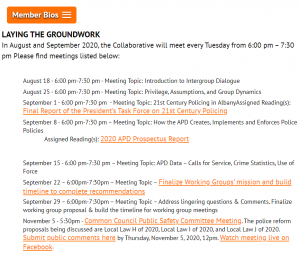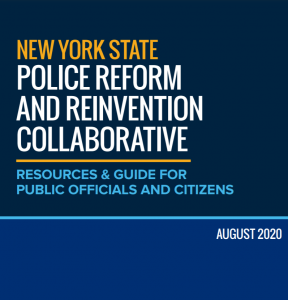On June 12, Governor Cuomo issued an Executive Order requiring each local government in the state, with a paid police department, to adopt a policing reform plan by April 1, 2021.
On June 15, Mayor David was quick to respond, explaining to Bob Joseph on WNBF that a coalition will soon be named to start reviewing police policies and procedures in compliance with Governor Cuomo’s Executive Order.
Five months later, however, there have been no meetings. Mayor David hasn’t even named a single person to the panel. And I know of at least 10 folks (including me) who emailed his office with an interest to serve back in June and July, per the Mayor’s own directions, and not one of us ever got even a courtesy response.
Mayor David’s inexcusable delays have turned this entire process into a farce. There is absolutely no chance to have a meaningful, inclusive discussion about community safety reforms and still meet the deadline of April 1.
Consider the suggested timeline that is in the excellent and informative 139-page Guidance Booklet the Governor’s Office issued in August to support the approximately 500 local jurisdictions impacted by his Executive Order.

We are closing in on December with the holidays quickly approaching, and Binghamton Mayor Rich David hasn’t even named the members of the panel.
If we start at the deadline of April 1 and work backwards, it’s clear the panel has no chance to develop anything of substance that reflects genuine engagement with the very real concerns about the status quo approach when it comes to community safety.
- According to the helpful Guidance Booklet, the local plan needs to be ratified by City Council. City Council’s last meeting in March is March 17. Let’s assume they organize a special meeting at the end of the month, and meet on March 29 to approve the plan.
- The Guidance Booklet requires the draft plan to be released for public review and public comment. Local panels are encouraged to find creative, multiple ways to explain the draft document to the public and to invite feedback, particularly given the likely restrictions imposed by COVID. The state also encourages local panels to actually revise and improve the plan based on public feedback. So, it’s fair to assume the draft plan will need to be released around March 1, with ten days of public comment and at least one in-person and/or virtual meeting. Then another ten days to revise it, and then the final draft made public before it goes before the Counci
- If the draft plan needs to be released by March 1, then the plan needs to be written two weeks prior.
- That means the panel will have all but 2 months to meet to review policies and data, question gaps and alternatives, engage the community, agree on goals and reform measures–and that’s if the Mayor names the panel and hosts the first meeting by December 15.
Two, or even three, months to meet with diverse stakeholders to have difficult but necessary conversations about substantive reforms to a policing system that is inflexible and stubborn to change is both a joke and a shame.
Consider some of the suggested items included in the Guidance Booklet that all local police reform panels should discuss:
- What functions should the police perform? The booklet offers many examples of other local governments that shifted traffic stops and service calls about folks with addiction, mental health, or experiencing homelessness to better trained, non-law enforcement officials, leading to better outcomes for those in need, improved community safety, and cost savings for taxpayers.
- Could shifting resources to investments in people and places actually increase crime prevention? Again, with some examples, including a program (SNUG) right here in New York piloted in about eight communities, including Poughkeepsie, Troy, Syracuse, and Albany.
- Should law enforcement have a presence in schools?
- How should the police engage in crowd control, and are SWAT teams overused?
- What data is being collected by the department, and what does it suggest? Where are problems?
- What strategies can be explored and implemented to reduce racial disparities and build trust, such as restorative justice programs, diversion programs, and community outreach?
- Does the training emphasize de-escalation or “warrior” mentality, and how can training be reimagined to advance systemic changes?
- How does the community have oversight over police actions, and what extent is appropriate? Many examples are provided, like Citizen Review Boards, independent inspector generals to handle complaints, etc.
- How does your recruitment and hiring process help advance or stall reforms? What incentives are offered to advance more just policing?
- And much more…..
Whoever will be named to the panel, Mayor David’s delays have already set them up for failure. Having no more than 3 months to engage the hefty questions above, each of them worthy of multiple meetings and community listening sessions, renders the whole exercise meaningless. This narrow timeline makes honest conversation impossible. It makes listening impossible. It makes trust-building and consensus-building impossible. It makes meeting the moment impossible. And Mayor David bears full responsibility for this failure.
A quick google scan shows that his counterparts took this challenge far more seriously. Many other municipalities are already well into the process, both small and big communities. Buffalo Mayor Byron Brown announced police reform panel appointments in early September. Mayor Walsh in Syracuse has been active on this issue since taking office in 2018, and in October even announced a dedicated website to the City’s efforts to reform policing to increase transperancy and accountability when it comes to monitoring progress. Utica Mayor Robert Palmieri announed his police reform panel appointments at the end of August.
Albany is 
Schenectady’s police reform panel announced nine (virtual) community meetings between October 21 and November 12 as part of its commitment to inclusion and listening.
Even smaller or similarly-sized communities like Watervliet, Cohoes, Peekskill, Poughkeepsie are all weeks or months ahead of Binghamton.
Rather than trying to pretend that the panel can take this challenge seriously in such a short period of time, Mayor David should appeal to the Governor for an extension. He could say “we’d rather get this right than meet some arbitrary deadline.” September 1, 2021 seems about right.
Because without the extension, this is already a failure. Everything between now and April 1 will be theater.
Maybe that was the point all along.

